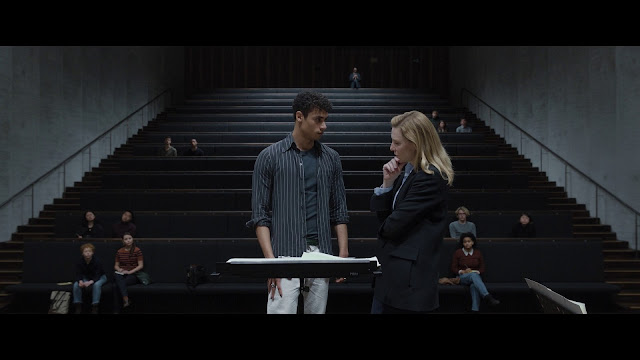 |
| Cate Blanchett with Zethphan D. Smith-Gneist in Tár. |
Todd Field’s Tár is one of those self-important, self-promoting movies of the moment that might as well be waving a banner that proclaims, “You’d better take me seriously.” It’s angry but the anger is generalized, and though it takes on the hot-button topic of celebrity sexual misconduct, it doesn’t present a coherent argument. Field must believe that if it did, it couldn’t pass itself off as complex and provokingly unresolved. Tár reminded me of a number of movies I despise: Sidney Lumet’s alleged attack on television, the 1976 Network (screenplay by Paddy Chayefsky); half a decade earlier, Mike Nichols’s alleged critique of the superficiality of American sexual relationships, Carnal Knowledge (screenplay by Jules Feiffer); two decades earlier than that, Billy Wilder’s puffed-up indictment of tabloid journalism and the callousness of the American public, Ace in the Hole (screenplay by Wilder, Lesser Samuels and Walter Newman). All of these films substituted bitterness and cynicism for character logic and used them as battering rams, and Tár follows suit. The discomfort they heap on audiences is supposed to be an indication of profundity, proof that they’re revealing ugly truths that only morally committed filmmakers would have the courage to put on the screen. But there isn’t a convincing moment in Tár. It’s two hours and forty minutes of foul-smelling hot air. No wonder Field – who both wrote and directed – hasn’t made a movie in sixteen years. (His debut feature, the shallow, manipulative In the Bedroom, came out in 2001; his second, Little Children, a saga of paralyzed suburbanites that flatters the audience by putting us in a position from which we can look down at the pathetic characters, followed in 2006.) It takes a long time to store up so much rancid baloney.
